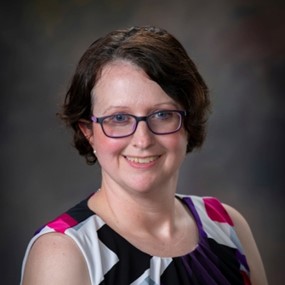Director: Dr. Alisha Jones
Program: AuD
Description: Dr. Alisha Jones, the director of the HEAR Lab, has three lines of research. The first line of research focuses on interdisciplinary education for professionals on Universal Newborn Hearing Screenings. Currently there is a collaboration between the Department of Speech, Language and Hearing Sciences and the School of Nursing focuses on educating future nurses on Universal Newborn Screening procedures. The second area of research focuses on the effects of prematurity on the auditory system. There is an ongoing collaboration within the Department of Speech, Language and Hearing Sciences examining the effects of prematurity on various aspects of communication disorders. The third line of research focuses on aural rehabilitation.
Current HEAR Lab Research Projects:
- Evaluating central auditory processing disorders (CAPD), language and cognition skills in children born prematurely
- Primary Investigator: Dr. Alisha Jones
- Co-Investigators: Dr. Allison Plumb and Laura Willis
- Funding: Auburn University Intramural Grants Program – Seed Grant (awarded April 2016) $6,100.00
- The goal of this study is to examine auditory processing, language and cognition skills in children ages 8-11 years who were born prematurely (< 37 weeks gestation) and compare those skills to children ages 8-11 years who were born full-term (>37 weeks).
- Acceptable noise levels (ANL) in adults
- Primary Investigator: Dr. Alisha Jones
- The goal of this study is to examine the following aspects of acceptable noise levels adults with and without hearing loss: self-efficacy, personality, parenthood and verification of the ANL test through the uHear app.
- The effects of aural rehabilitation programs on acceptable noise levels
- Primary Investigator: Dr. Alisha Jones
- Funding: Capita Auditory Foundation Grant (awarded December 2017) $7,750.00
- The goal of this study is to examine the effects of three different auditory training programs (i.e. LACE, clEAR, and Angel Sound) on acceptable noise levels in adults with hearing loss.
Completed HEAR Lab Research Projects:
- The effects of the listening and communication enhancement program (LACE) aural rehabilitation program on acceptable noise levels and perceived hearing aid satisfaction.
- Determining the clinical effectiveness of Universal Newborn Hearing Screening training in nursing students.
Current Doctor of Audiology Student Capstone Research Projects in the HEAR Lab:
- The effects of prematurity on the auditory system: A systematic review.
- The effects of prematurity on the vestibular system: A systematic review.
- Traditional vs. self-assessed acceptable noise level procedures in young adults.
- Influences of prematurity on central auditory processing disorders: A retrospective study.
- Prevalence of auditory processing disorders diagnosed in the premature population and associated patterns.
Completed Doctor of Audiology Student Capstone Research Projects in the HEAR Lab:
- Myers-Briggs type indicator dichotomies as a predicator of hearing aid benefit in adult users.
- Will acoustic reflex threshold testing prior to otoacoustic emission testing affect DPOAEs?
- Outcome measures in APD: Professional reports from the workplace.
- NICU parent education on hearing loss.
- Does perception play a role in listening preference between basic and premium hearing aids.
- Pediatrician’s role and knowledge of universal newborn hearing screening, diagnosis and protocol.
- Determining clinical effectiveness of Universal Newborn Hearing Screening training in hospital staff.
- Implementation of amplification, assistive listening devices and environmental modifications among nursing home staff: a study of in-service training with nursing home staff members to assist and improve communication with hearing impaired residents.
